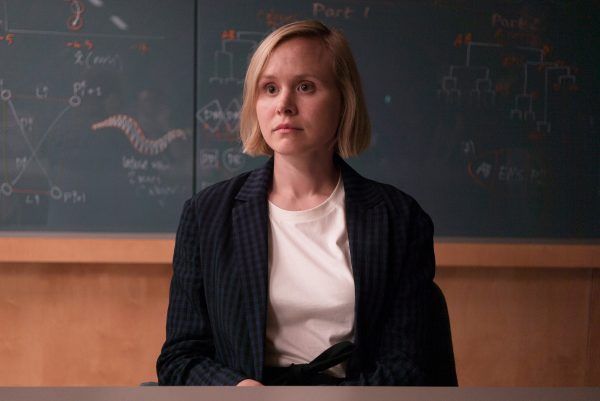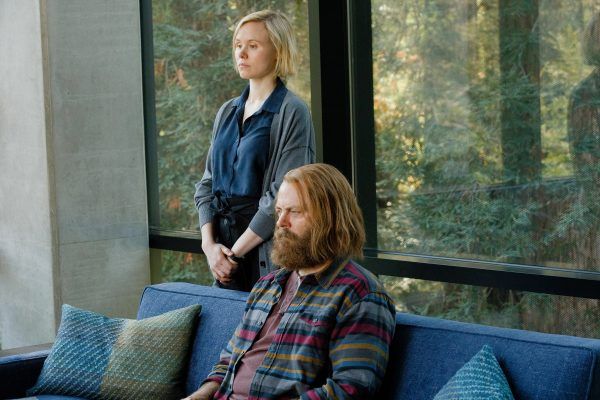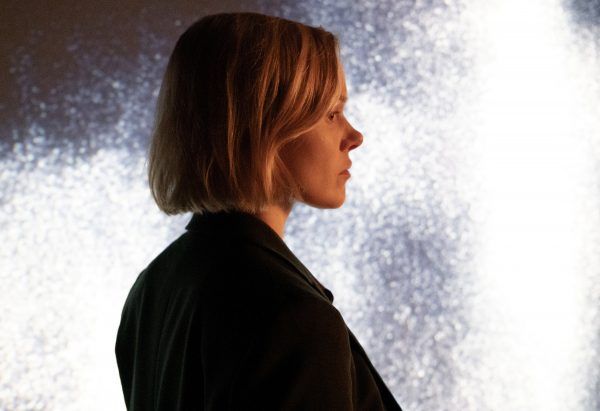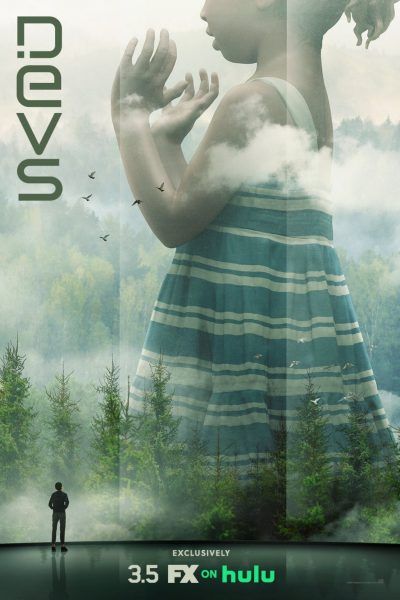From creator/writer/director/executive producer Alex Garland, the limited series Devs, which is available to stream at FX on Hulu, follows software engineer Lily Chan (Sonoya Mizuno), as she tries to investigate the ultra-secretive development division of the cutting-edge tech company that employers her, following the murder of her boyfriend (Karl Glusman). As Lily gets in deeper and the extent of Amaya CEO Forest’s (Nick Offerman) commitment to the Devs project is pushed to the limit, the success of the company’s covert work is threatened, which could result in dire consequences for everyone.
During this 1-on-1 interview with Collider, actress Alison Pill (who plays Katie, a gifted quantum physicist and Forest’s second in command at Amaya) talked about how this project was presented to her, what ended up helping her land the role, exploring such thought-provoking ideas, why this was such a perfect experience, how Katie’s physicality helped her in finding the character, what she thinks of Katie, following up this shoot by doing Star Trek: Picard, and waiting to read the next project that Garland is writing for the Devs cast.
Collider: This is a highly addictive show that you just want to keep watching. What were these scripts like to read?
ALISON PILL: It was so confounding and mysterious and compelling and interesting. It’s just really interesting stuff. The level of talent, kindness, and commitment that Alex [Garland] gets from everybody, everybody has to be at the top of their game and it’s contagious, from every department.
How was this initially presented to you? Did you know what it was going to be?
PILL: Well, how was presented was, “Alex Garland is doing a TV show. He’s interested in you for this thing.” He got my email, and he emailed me and said, “Here are the scripts. This is what it is. It would be for Katie, and you should read until at least Episode 4.” And I was like, “Okay, Alex Garland, I’ll make sure to do that.” He had seen me in the play, Three Tall Women, that I did, a couple of years ago, and there were some odd echoes, just in terms of the power dynamic, that he might’ve been interested in. So, he sent me the scripts and I devoured them, and it was just really interesting. We didn’t meet until we were ready to start pre-production. Within that first rehearsal, I was like, “Oh, this is like home. This group of people, telling this kind of story, is home.” It was satisfying and real and respectful, and it’s just a way of working that you don’t realize that you’ve been missing until you’re there.
Was it an unusual experience for you to have a project that you were doing, essentially become an audition for this?
PILL: That’s all it ever is. Somebody saw me in something, and they thought of me for something else. If you’re lucky enough to be a working actor, that’s often how it goes. And he has his own reasons for it, that I won’t pretend to know.
What’s it like to tell a story that explores such thoughtful and thought-provoking ideas?
PILL: It was so exciting, and it’s continued, honestly. The same way that the respect and bringing your very best self to work is contagious, so is this idea that we should be thinking about big things. Once you start, the ball keeps rolling. While we’re living in a world that is so seemingly immediate and that is very instantaneous, in every way, we got to think about things that need to steep, and that are not concepts that are natural or instantaneous. I read some books about women in tech. A Briefer History of Time, by Stephen Hawking, is fantastic. It’s a known book for a reason. It’s not the Brief, it’s Briefer, which is even less math with more clarity, to give you an understanding of the history of science.
And then, from there, I talked a lot to Alex about the concept of infinity. This is not related to anything that’s actually in the show. There’s no moment when you’re like, “Hey, let’s discuss infinity.” But truly, as a mathematical concept, it’s absurd. It’s a crazy thing to think about. What is infinity? How do you even get close? How do you reach infinity? How can you do math with infinity? So, to say that it was interesting to work on, with all of those thought-provoking things, beyond being an actor, it’s a very complicated world to live in, morally. How do you act like this is what’s happening? Spooky action, at a distance, is an observable phenomenon. It left me head-scratching and inspired. It’s not the immediate resolution of any idea. You don’t go, “Okay, two plus two is four. Got it.” It’s the part of science that’s all gray area because you’re like, “Is it a wave or is it a particle because it acts like both?”
Was it sad to have to say goodbye, after all of that?
PILL: It was, and it wasn’t. You so rarely get to be a part of something perfect, and you so rarely get to have a perfect working experience, to be able to travel, to work with people you love, and to do work that you think is important, and it’s the most bad-ass move you could do because it is a close-ended story. It has an ending. You can’t go from there. I think the mistake that many people make is trying to exceed or repeat or revisit the wrong things, from their past projects. It’s why sequels so rarely are good. You’ve told the story, and you’re trying to recapture that. You’re grasping at straws to try to figure out what the magic was, but you don’t know what the magic was. There’s a real gift in that.
Listen, I would’ve been very depressed, had I not known that Alex had also dreamt another limited series involving [this cast], to tell an entirely different story. As a storyteller, he has gone all over the map and has maintained the good parts, while doing things that are so incredibly different, in terms of the narrative or the style. I love Dredd. I really do. I think it’s a great action movie and the concepts in it are great. Whatever he touches, he’ll bring something unique to, so it’s also the fan excitement of, what is it gonna be? He’s told me my part’s great, so basically everything is fine because I’m gonna be employed.
This series is deceptive, in that it seems, at least initially, that the characters are pretty cold. But then, you get deeper into that and you see how interesting and layered the relationship dynamics are.
PILL: I would say that’s Alex’s gift. Ex Machina is one giant philosophical discussion about gender, consciousness and personhood, but it’s also about four really interesting people, locked up in a house together. Without the people, none of the technology exists. We are part of the technology because we are the people making it. So, all of the fallible humanity of us is so intrinsically linked to what we make. I just read the excellent collection Exhalation, by Ted Chiang, of his short stories, and he has a similar way of going, what is the human side of that technology? You can look at it as cold, but it’s absolutely not. We all use this stuff. It’s not in some refrigerator out in Silicon Valley. It’s in our purses and in our lives. So, it’s very important, when you’re talking about this stuff, to also have a real human element because that’s the main driving force behind it. Until the robots take over, it’s still us, who’s making the stuff.
After doing something like this, how did you find the next project?
PILL: It was really difficult because it was this contagious thing where you’re like, “Oh, man, we could be doing this with all art, all the time.” No, we can’t. Not all of us are Alex Garland, and we absolutely could not. Not all of us have spent 15 years thinking about determinism enough that we could make an eight episode thing. It’s not gonna happen, and that’s okay. And that was the thing that I had to come to.
Art definitely has to ask questions. I don’t think art does nothing. I just don’t believe that. The stuff that you think is fluff, or whatever, is still doing something. People are still taking it in. Whatever the lessons of it are, be they fluff or not, you’re still taking in what the dynamics are, of gender and race, how we interact with other humans, what we’re talking about, the way the words are written. You take it in, so you can’t say that it’s meaningless, if people are watching it. But I also recognize that people are so entirely different, in terms of what they’re interested in, so finding the ways to frame different questions is important, too. Doing Star Trek, right after this, that’s famously philosophical, in terms of some of the same questions of personhood, and what humanity is and what it’s capable of. It’s framed in a very different world, in very different ways, and in a very different context. We may not be able to question the nature of reality, in everything we do, but I think we should be questioning at least the world we live in, with everything we do.
When you do a show like Devs, you have an audience coming in with no expectations because they don’t know what it is, but something like Star Trek has such a huge legacy. What does that feel like?
PILL: You think it’s gonna be one thing and, in some ways, it is. There are still goosebumps moments, like when Patrick [Stewart] does something for the first time and you’re like, “Oh, my god, Captain Picard” And I definitely had those goosebumps moments. But there’s also the reality of making a new TV show. You’re there, every day, with a new crew and you’re figuring out what that TV show is gonna be, so you forget about it, for a moment, while you’re actually making it, in the studio. There are definitely moments when you can step out and go, “Oh, my god!” And I also was nerding out, big time, because Michael Chabon was our showrunner. He’s one of my favorite novelists, and it’s thrilled to pick his brain about story. Novelists make good showrunners.
When you do something like Devs, that doesn’t have a lot of dialogue, is it about finding the character for yourself, or did you talk about the relationships?
PILL: There was a lot of discussion and a lot of internal work. Thankfully, having all eight scripts meant that we knew the story so well, and some of the backstory is clarified with flashbacks, so you have enough of a sense. And then, in talking to Alex, he allowed a good deal of freedom, but it was also on the page. I really found my way in to Katie through posture and how little she moves, which was really helpful. We were shooting in different places in the world, over the course of so many months, so I was like, “Okay, what’s my way in?” And Katie doesn’t move that much. Alex was like, “I don’t know anybody else who has a worldview like Katie. I don’t know anybody who sees the world the way she does. Nobody has ever existed that sees the world like Katie does.” So, what does that do to a person? It was a really interesting thing to play and get into.
You’re also playing thinking because everybody is doing a lot of thinking, and it’s really easy to get lost. In the introduction of the David Foster Wallace book about infinity, he talks about how, from past experience, one would assume that the floor will hold me when I get out of bed, but most of it is empty space. The vast majority of the things that we think are things are actually space. So, that’s a mind fuck. When you get into infinity, do you mean that the universe is ever-expanding because no, it’s not, so where is the end. And then, you get into determinism and you wonder, what came before the Big Bang? What is the beginning, and what is the end?
What do you think of Katie?
PILL: She’s the best. I love Katie. I know what people will think of her, but she’s a fully moral, smart, intelligent person. I don’t disagree with her actions, based on what she knows. Even in this day and age, how many people want women to be likable? Even when they say they want an anti-hero, they want Walter White, but a lady, and then, they’re like, “Can you give her a backstory that makes it understandable, why she would be mean? Why can’t she smile more?” And at no point was Alex interested in having the ladies smile more. These are discussions among exceedingly competent, brilliant women, who are talking about the nature of reality. I’m sure a lot of people will think she’s the villain or the bad guy, but I disagree. I think she’s great. I’m a big fan.
Has Alex Garland told you when you’ll get to read the next project that he’s writing for this cast?
PILL: No, he’s been doing research on it and pondering. He’s somebody who ponders, and then writes at a freakish pace. He’s a freak. When you told me that he read these eight episodes, one of the people at FX was like, “Yeah, they came in, in three months.” A writers’ room would have six months with eight people and be like, “Yeah, we’re gonna need to tweak a lot of this.” And was like, “Yeah, I finished that, by myself, in three months,” ‘cause he’s a freak.
Devs is available to stream at FX on Hulu, with new episodes on Thursdays.





